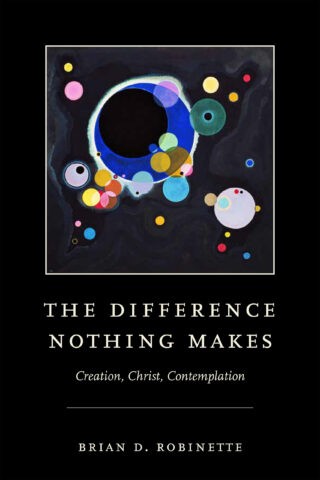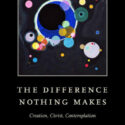
Response to The Difference Nothing Makes by Brain Robinette
To read the whole conversation
Brian has gifted us with an extraordinary feat of thinking. For those outside the guild, this might seem impossibly abstract. However, for anyone with some appreciation for what this does in terms of enabling meaning to be sensed where none is apparent, of holding seeming opposites in different forms of tension, and of enabling clarity at the furthest outreaches of intellectual possibility, this is truly a gift to be met with gratitude and even, dare I say it, awe. I am very proud, and not a little scared (especially when it comes to the discussion concerning Bulgakov and Rahner, which is way beyond my pay grade), to have been invited to share in a Syndicate response to this book. That I am somewhat on the same page as Brian should come as no surprise, given our shared debt to Girard’s thought, and Brian’s generous mentions of my own writings in part II. However, I hope that I am doing more than beating a shared drum or tooting a shared trumpet, when I say that I find it particularly hopeful for the future of theology that Brian gives texts that are classical without being defensive, and modern without being dismissive. There is something here that is central to a non-polemical, and thus graced, living of Christianity as Vatican II “settles in.”
What I would like to do in this forum is explore Brian’s central point with a musing which I hope comes close to, or rubs up, against it. This concerns an analogy for creation which is very precisely an analogy for a creation out of nothing.
The death of Christ as analogy of the “nothing” that makes a difference
One of the problems of our word “creation” is that, in ordinary speech the word comes with a whole set of resonances which are to do with “making something.” Whether in the far distant past, contemporaneously, or both. With the result that our discussions are typically about the chunkiness of what is around us, how things came to be. Manifestly discussions privilege our natural assumption that we make things out of pre-existant things—pots out of clay and so on. When it comes to God’s creation we quickly say that in this lies God’s difference to us: that God makes things without there being any pre-existent things or un-things which might be transformed into what we see, know, and inhabit. The word “nothing” doesn’t refer, as Brian points out, to some sort of negative thing about which we can talk, but is more like a negative gesture, a refusal of a word. One made even while we are aware that our very negatives (given that we are “things that are”) are by opposition to something, while there is simply “nothing” contrastive or oppositional in the “nothing” we use in order to hint at the unrivalled and unbounded freedom and power of the Most High.
Scripture uses the potter/clay analogy in a couple of places, but the key analogy in Genesis and second Isaiah is speech: God “says let there be…” the word leads to things. It is the power of a word to lead to something that is the analogy. It would seem to depend on a relationship of power between the one speaking and that which is spoken into being—a king commanding a city to be built, or some such.
Please remember that the point of an analogy in this sphere is that it is held to be pointing to something true, but where the dissimilarity between the image used and what is really true is far greater than any similarity.
However, if we give weight to the key passages in John’s Gospel, the Epistle to the Hebrews and various of Paul’s epistles where creation is in some way attributed to Christ, and those in the synoptics which tell the same thing in narrative fashion, then we find ourselves being given a new and rather fuller analogy for the act of creation than we might expect. And this is because it develops both the positive relationship between nothing and what is and the power dynamic involved in a way that is strikingly dissimilar to any notion of power that we may have. It fills out the power and the deliberation of the “Word” that “speaks” into being.
I will illustrate this narratively. From Jesus’ baptism in the Jordan until his death on the cross it becomes clear in the references to the Spirit that creation is being talked about. At the baptism the Spirit that had been “hovering over the waters” comes down upon Jesus as he “comes up” from the waters. It does so in the shape of a dove. In Genesis a raven had swept away, or dried up, the waters of the flood by beating its wings, and a dove had been used by Noah to test whether there was dry land, before finally setting off and not coming back. In the baptism the wandering dove finally settles on Jesus.
The “coming up” from the waters is that of the ordination of the Great High Priest (the Son, the Melchizedek figure pointed to in the Psalms which are referenced in the Gospels), and the “opening of the heavens” to him is what would have been expected for the High Priest in the Holy Place in the Templewhich symbolized precisely the open heavens prior to creation. But here the opening is happening outside the institutional framework, by the river Jordan. While John the Baptist by his lifestyle, preaching, and choice of place had summarized the prophets and the law, the baptism of Jesus takes us further back, to the beginnings.
Jesus’ life then is the living out of the Son who shows who he is by signs and by teaching and eventually turns to fulfil the rite of atonement, voluntarily and deliberately, in the midst of a concatenation of human violence. Again, this is conducted outside the relevant institutional framework, though entirely framed by language derived from that framework.
Shortly before dying, in the garden, Jesus enacts the new Adam getting right what the old Adam got wrong, and is taken to his trial and execution. On the way to the cross he is stripped of the seamless tunic, referencing the tunic with which the High Priest would have been vested at the feast of the atonement to indicate the Son’s entry into created reality. As Jesus is on the cross, the sun’s light fails and darkness covers the land, so we are back before the first day of Genesis. Then the veil of the temple rips open. Thus is marked the removal of the separation between heavenly reality and the current material reality to which we normally refer as “creation.” Simultaneously Jesus breathes out his Spirit, which takes us back to before the foundation of the world, the hovering Spirit of Genesis 1.
Now however the contentless hovering Spirit has acquired the full content of the reality of Jesus’ human life, lived up to, and including into, his death. And it is this that is so important in the breathing out of the Spirit. Whereas up until now the Holy Place in the Temple was kept absolutely separate from death, now death has been assumed, occupied by Jesus so that what he breathes out is now the Holy Spirit, the Creator Spirit, which has emptied death of its power and will now be given to empower others to live as if death were not, and so become insider participants in finally accomplished creation, sons and daughters in the Son.
Please note that what is offered here is a counter-chronological account of creation, using the texts and reference points of the Hebrew Scripture and Temple tradition, one that seemed comprehensible at the time to authors sufficiently different from each other as the four evangelists, Paul and the author of the Epistle to the Hebrews.
In this counter-chronological account of creation the whole of Jesus’ life leads up to him performing a content-rich act in dying. In that act of dying he breathes out the Spirit which now has real anthropological content—content at a humanly available level—making what the fullness of creation looks like begin to become intelligible and habitable by us.
Because we are so used to this narrative, I want to ask us to go slow and think a little of the central place of “nothing” in it. For ever since we became human, and able to think about death, there is nothing more nothing-y than death. It is for all of us, very obviously, the ultimate despoliation of everything that is. After it, someone who was there is not there. There is suddenly a jarring hole within a set of relationships that were previously more or less supportive of the deceased, and more or less supported by the deceased. Far from “nothing” being an intellectual abstraction, it is an entirely existential and fully corporal and physical awareness that, absent an entirely invisible “Other” who might maintain us as a living embodied being yet to be imagined, all our power, creativity, imagination, plans and so on come to an abrupt end and the physical elements which sustained them are very quickly transformed into something quite else.
It is in Jesus’ occupying the space of death (“tasting” it as Hebrews says) before us, in our face, that we have the sense God gives to the nothing out of which God creates. And what does this something out of nothing look like? It looks like someone doing something almost incomprehensibly rich for us, ending in that person’s death. Which means that they are before us as absolutely powerless. Someone who has died has no power over you. Even their will can be contested whether by heirs or lawyers. But the dead person has no say. Whatever it was that they wanted to communicate with you before their death is no longer their property, to alter, to interpret, to correct. The “for” you, me, us, is suspended in nothing.
The sort of power by which the Creator brings into being is the same sort of power that a dead person has. The closest human analogy to nothing. Yet the expiring breath manifests the whole divine interpretation of that particular death and the life that led up to it, such that it might indeed move you in a way that is entirely different from any sort of “being moved by a power” of which we are aware. But you have no obligation to be moved by that power. Indeed it is only able to be perceived as a power at all when you remember and understand that someone did that for you. In other words, that there was a love for you in the dead person having occupied that space. And that your access to recognizing and receiving that love passes through that dead person’s imagination possessing you such that you begin to be stretched towards arduous goods that were previously unimaginable to you; and you relax into that dead person’s conviction that you too are able to walk across “nothing” to be able to become like him.
When Paul says “Christ crucified, the power of God and the wisdom of God”, he is, I think putting forward the analogy of creation. Jesus displayed as dead before us, with the background story that led to that moment, including the instruction that we remember it as something given, acted out, beforehand, actually is the nearest analogy we have for the power of creation out of nothing. And the wisdom of God is the creative intelligence which led Jesus to occupy that space, knowing that once detoxified for us, and so occupied without fear, it would render intelligible everything that is, by rendering us sharers in the growing intelligibility of what is.
So the final breath of a violently tortured dead man reaches us, if we receive it, the nothing-y-est of nothings. And yet Holy Breath enters into us in the middle of time to become intelligent participants in the bringing into being of the unimaginably ancient network of relationships which long more fully to disclose the power which looks more like “giving yourself away into nothing so that others may live” than anything else.

